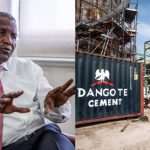...To get all news updates, Join our WhatsApp Group (Click Here)
Also Join our WhatsApp Channel (Click Here)
But this only lasted a short while, as he had to fight many battles in the process.
Remarkably, OGD operates what can best be termed the politics of the people. Not only is he loved and cherished by the people of Ogun state, he ensures that his political moves are in tandem with the desires of his people. That was why he had to leave the PDP to join the Labour Party. His reason for joining Labour Party was to build a platform that will serve as a proper check mate for irregularities in governance of the state. Though people in the PDP frowned at this but the masses joined him to follow the party. Labour Party became the most dominant opposition party in the state taking over from the PDP. While skeptic analysis said it was an act of desperation for him to have left PDP for Labour Party but majority of the people of Ogun State didn’t care, they started declaring their support for him. He became the voice of the masses speaking against unhealthy antics of the state government.
After much deliberations and reconciliation meetings orchestrated by the National Leadership of PDP, Gbenga Daniel returned to PDP in October 2014. He returned back to PDP with massive supporters from the Labour Party which became a big boost for the PDP. But as the years rolled by, the internal wrangling and power tussles within the party took on greater dimensions, en route the last general elections. Things looked as if they couldn’t get worse, but they did, as the PDP lost the elections to the ruling All Progressives Congress (APC).
Politically, the PDP had lost its teeth within the political schemes in Ogun state. No longer was it the formidable party of yester years; this is notwithstanding OGD’s large followership in the state. Political pundits and analysts have for years posited that a move for the political gladiator away from the PDP and its many problems will be the best move for OGD’s political life as well as a win for the people that have come to love and trust him.
It, therefore, came as cheery news when he announced his return to politics on a formidable platform like the APC. OGD’s return to politics and the pitching of his tent with the APC marks something of a comeback for the Ijebu political titan, whose political exploits appeared irretrievably tainted by the internal wrangling and power tussle that afflicted the People’s Democratic Party.
Onboard APC, OGD relevance, political clout, prowess, etc, go beyond Ogun State to the national level for the greater good of the Nigerian people. This can be envisaged from his programme on Public Private Partnership which attracted several businesses into the state during his tenure. And why not? From education to health, sports, economy, agriculture, urban renewal and rural development, power, infrastructure, human development, housing, industrialisation, tourism and employment generation, OGD’s imprints in the state were phenomenal!
As at the last count, about 70 companies berthed in Ogun State from 2003 to 2011 with over 250,000 jobs provided through various employment generation schemes of the State government. In his eight years, the OGD Administration did more roads than all the administrations before it and most of these were done through direct labour with the Ministry of Works and the Ogun State Road Management Agency OGROMA. By utilising this method, costs were significantly saved while the confidence of indigenous engineers was reinstated in the people. The Olumo Rock resort was refurbished meeting international tourism standard, the MKO International Stadium Abeokuta was renovated and three other stadiums in other geo-political zones of the state were constructed to FIFA specifications.
The NYSC orientation camp in Sagamu is reputed to be the best in the country while the Tai Solarin College of Education was upgraded to University status making it the first in Nigeria and second in Africa. It was adjudged the best University of Education In Africa in 2011. The construction of a modern secretariat for civil servants in the state at a cost which beat the imagination of late President Umar Musa Yar’Adua who commissioned it remains a landmark.
The construction of the six-lane Lalubu Road – the commercial nerve centre of Abeokuta – without a single demolition of existing building was to become a standard in road constructions in Ogun State today.
For OGD, the governorship was a 24-hour job. The last project he commissioned, the OPIC PLAZA remains, till date, is the tallest structure in Ogun State.
Perhaps it is not immodest to say that the incredible performance of Otunba Gbenga Daniel is now a benchmark to measure the performance of future leaders of the gateway state. In the words of the Nobel Laureate himself, Professor Wole Soyinka, “The various projects embarked upon by Governor Daniel are laudable and practical”.
If his decisions have gained him so much love and respect from his teeming apostles and the good people of Ogun State in the past, then who dares question why a lion decided to roar again?
Ogidi Omo has once again thrown his hat into the ring. He is the APC senatorial candidate for Ogun East and given his antecedents, there is no gainsaying that the good people of his senatorial district are in for the best available representation at the national assembly.
You can get every of our news as soon as they drop on WhatsApp ...To get all news updates, Join our WhatsApp Group (Click Here)
Also Join our WhatsApp Channel (Click Here)

















